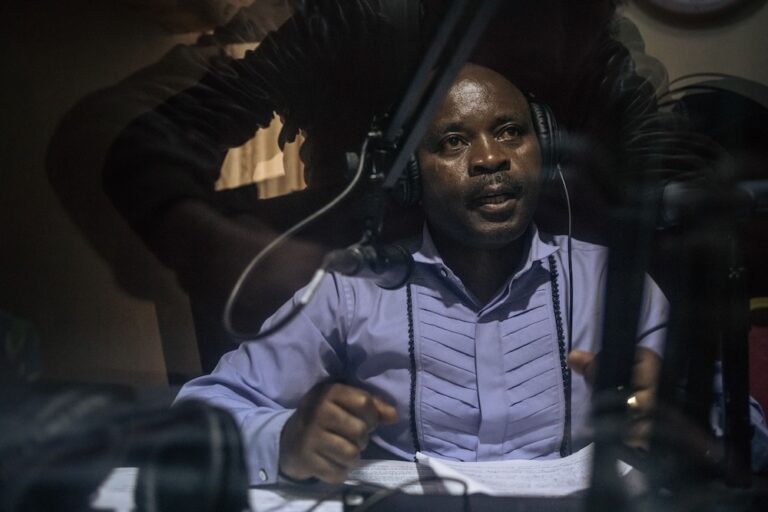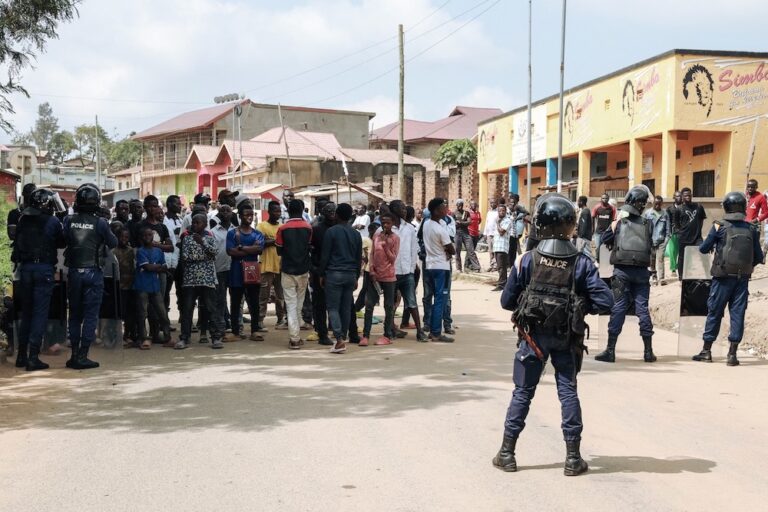(RSF/IFEX) – The following is a 31 August 2005 RSF capsule report: One month after the assassination of a Pascal Kabungulu Kibembi, a Congolese human-rights activist, RSF has expressed consternation over the “terrible climate of fear” faced by journalists working in Bukavu and the eastern provinces of the Democratic Republic of Congo (DRC). RSF calls […]
(RSF/IFEX) – The following is a 31 August 2005 RSF capsule report:
One month after the assassination of a Pascal Kabungulu Kibembi, a Congolese human-rights activist, RSF has expressed consternation over the “terrible climate of fear” faced by journalists working in Bukavu and the eastern provinces of the Democratic Republic of Congo (DRC).
RSF calls on the authorities in the capital, Kinshasa, to “find just and lasting solutions” to the various problems identified by media professionals confronted by constant violence in these provinces. RSF urges Congolese political movements to “take energetic measures to publicly assure journalists of their respect” and to ensure that “press-freedom criminals are not granted, as they are today, a prime space in democratic debate.” RSF also calls on the United Nations to “seriously take into account” the working conditions of the press in the preparation and evaluation of the DRC’s upcoming elections.
Kabungulu, aged 55, was shot and killed at his home in Bukavu (eastern DRC) in the presence of his family on 1 August 2005. Shortly after 3:30 a.m. (local time), two uniformed men and a man in civilian clothes, armed with AK-47 machine guns and knives, broke into the home of the executive secretary of Heirs to Justice (Héritiers de la justice), a group based in Cyangugu, Rwanda, and the vice president of the Great Lakes Region Human Rights League (Ligue des droits de la personne dans la région des Grands Lacs) based in Kigali, Rwanda. “Today is your last day,” one of the unidentified men reportedly told him in Swahili. “You think you’re invincible because of what you write and say in the newspapers and on the radio. We’re fed up with you, journalists and human-rights activists, who think you can change the world.” In front of his children and wife, they shot him in the chest with a burst of Kalashnikov fire. The killers escaped, taking with them their victim’s telephone, computer, television and video recorder.
Since the murder, journalists in eastern DRC are living in fear. “We have to censor ourselves if we want to save our skins,” a journalist from the community radio station Maendeleo told RSF under cover of anonymity. “In the current context, in which the life of a journalist or a human-rights activist is worth nothing, how do you expect us to say what we know?”
After the execution of Kabungulu, suspicion unanimously turned toward Lieutenant-Colonel Thierry Ilunga, commander of DRC armed forces’ 105th brigade and a former officer with the RCD-Goma, a rebel group supported by Rwanda and Uganda that is now integrated into Congolese political life. In May 2003, Ilunga publicly issued a death threat to Kabungulu after the human-rights activist published a report on the RCD-Goma’s pillaging of Kivu’s mineral resources. “Nobody will make me believe that Kanbungulu was killed because he belonged to civil society,” the Maendeleo journalist concluded. “He was killed because of what he wrote about the wrong doing, massacres and pillaging organised by the Rwandans and people from the DRC.”
Questioned by RSF, most of the region’s journalists mentioned a “black list” of journalists and human-rights activists to be shot. The climate of permanent insecurity is fed by the impunity from which those who attack journalists appear to benefit. A few days after the assassination of Kabungulu, Lieutenant-Colonel Ilunga came, weapon in hand, to free two suspects, Captain Gaston and Lieutenant Vasco, who had been arrested by the police. To justify his action, Ilunga said that the two men had been placed under “house arrest”.
Several journalists and human-rights activists in Bukavu openly admit that they would prefer, if they could, to leave the region before the elections. “Let’s be serious,” a journalist from the public radio station RTNC, who was passing through Uvira, 130 km from Bukavu, told RSF. “Unless we’re crazy, reckless or suicidal, unless we want to become heroes, the only solution for us is to keep our mouths shut.”
A number of local journalists and correspondents say they regularly receive threats without daring to report them to organisations that defend human rights or press freedom.
The DRC’s political “barons” are thus imposing their own law over this eastern region, which is so coveted by neighbouring powers. The federal government, a fragile assembly of former combatants, has not insisted on re-establishing the rule of law in this volatile region bordering Rwanda, Uganda and Burundi. As a result, while much attention has been given to upcoming national elections, local barons’ appetites have grown and their strategies have been refined, say journalists.
“Not only do they have a lot of money, but they also understand very well the role and importance of the media during an election campaign,” says a female journalist from the community radio station Maria Malkia wa Amani (Mary Queen of Peace), which belongs to the Catholic arch-diocese of Bukavu. “Most of them own their own newspapers, their own radio and television stations. I wouldn’t be surprised to see, in the coming months, an expansion of the private media in the pay of such and such individual, or such and such political movement.” Once media outlets have been transformed into propaganda organs, independent-minded journalists who dare to contradict the editorial line by revealing electoral fraud or exposing the nefarious past of certain candidates, for example, could expose themselves to severe reprisals.
Even if general elections in the DRC take place peacefully, journalists will not escape from working in a climate of permanent psychosis. “In Kivu and other parts of the country, most journalists will not dare to reveal information that is detrimental to the post-electoral interests of certain candidates,” said the RTNC journalist. The Maria Malkia wa Amani journalist summed up the situation by saying, “What people ignore or minimise is that the pretenders to the throne are often vultures.”


